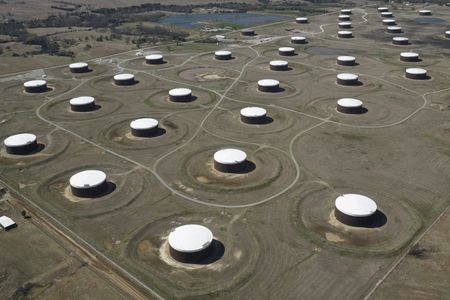 1
1 1
1

By Arathy Somasekhar
(Reuters) -Oil prices rose 2% on Friday after the International Energy Agency (IEA) said oil markets were tight, but crude benchmarks were still headed for weekly losses on jitters about looming U.S. interest rate hikes and concern that U.S.-Iran talks which could boost global supplies.
Brent crude futures rose $1.52, or 1.7%, to $92.92 a barrel by 1145 a.m. ET (1645 GMT). U.S. West Texas Intermediate crude gained $1.67, or 1.9%, to $91.53 a barrel.
Prices are on track for their first weekly decline after seven consecutive weekly gains.
Saudi Arabia and the United Arab Emirates could help to calm volatile oil markets if they pumped more crude, the IEA said, adding that the OPEC+ alliance produced 900,000 barrels per day (bpd) below target in January. [IEA/M]
The two OPEC+ producers have the most spare production capacity and could help to relieve dwindling global oil inventories that have been among factors pushing prices towards $100 a barrel, deepening inflation worldwide.
The IEA also raised its 2022 demand forecast by 800,000 bpd based on revisions to historical data. It expects global demand to expand by 3.2 million bpd this year, reaching an all-time record 100.6 million bpd.
Previously, the Organization of the Petroleum Exporting Countries (OPEC) said world oil demand might rise even more steeply this year on a strong post-pandemic economic recovery. [OPEC/M]
The prospect of aggressive U.S. Federal Reserve interest rate hikes and ongoing talks between the United States and Iran capped further gains in prices.
“Yesterday’s inflation number likely puts more pressure on the U.S. Fed to act more aggressively with rate hikes. This expectation is weighing on oil and the broader commodities complex somewhat,” said Warren Patterson, ING’s head of commodities research.
On Thursday, U.S. inflation data posted its biggest annual increase in 40 years, and St. Louis Federal Reserve Bank President James Bullard said he wanted a full percentage point of interest rate hikes by July 1.
Indirect talks between the United States and Iran resumed this week after a 10-day break. A deal could see the lifting of sanctions on Iranian oil and ease global supply tightness.
Earlier this week, U.S. inventory data fed supply concerns after an unexpected 4.8 million barrel drop in U.S. crude stocks.
“We can go on and on and on about Russia and Iran, but that’s all just speculation. At the end of the day there is a no denying crude oil storage is low,” said Robert Yawger, director of energy futures at Mizuho.
Democratic and Republican U.S. senators who have been negotiating for weeks on a bill to punish Russia for its troop build up near Ukraine are still looking for a way forward, aides said on Friday after the sides reached an impasse.
(Additional reporting by Ahmad Ghaddar and Ron Bousso in London; Emily Chow in Beijing; editing by Jason Neely and David Gregorio)